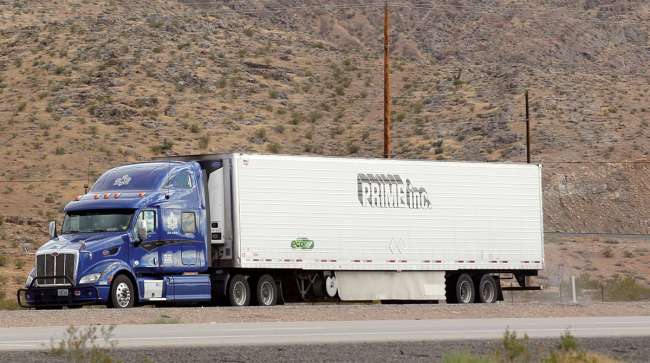Senior Reporter
New Prime Agrees to $28 Million Settlement in Contractor Dispute

[Stay on top of transportation news: Get TTNews in your inbox.]
Attorneys for New Prime Inc. and a potential class of 40,000 mostly independent owner-operators have agreed to settle two lawsuits, awarding the truck drivers a total of $28 million in back compensation and damages.
If approved, the agreement, filed in federal district court in Massachusetts on July 23, would end the drivers’ 2015 lawsuit, styled Dominic Oliveira v. Prime Inc. The settlement calls for awarding the court-certified class of drivers at least $100 each for allegations that Prime, based in Springfield, Mo., made significant deductions from the drivers’ paychecks and failed to pay them statutory minimum wages.
Under terms of the agreement, named plaintiff Oliveira would receive $50,000, and named plaintiff in a separate lawsuit included in the settlement, Rocky Haworth, would receive $25,000.
“The independent contractor has been a long-standing piece of our company and trucking in America,” New Prime General Counsel Steve Crawford said. “We believe that our business model is completely lawful and compliant with all regulations while providing drivers the opportunity to earn, based on their own efficiency and productivity, excellent compensation.”

5G wireless networks promise greater bandwidth, faster speeds and improved reliability. But how long will the industry have to wait until this technology is ready for fleet operations? Host Seth Clevenger talks with Chris Wolfe of PowerFleet and John Binder of Trimble Transportation. Hear a snippet, above, and get the full program by going to RoadSigns.TTNews.com.
He added, “We are proud of how we treat all of our associates, and we work hard to get it right. Nevertheless, we decided that moving past this litigation was the right thing to do.”
At press time, an attorney representing the drivers did not return messages seeking comment.
The settlement came 16 months after a U.S. Supreme Court decision in Oliveira’s favor that could limit the ability under federal law for motor carriers to settle disputes with owner-operators in arbitration.
The 8-0 high court ruling came in an appeal of the class-action lawsuit led by truck driver Oliveira against Prime that posed the question of whether an independent owner-operator under contract with a motor carrier must take any disputes to arbitration or instead be permitted to take grievances to court.
Legal experts have said the high court’s ruling could cause an increase in the number of future class-action lawsuits by truck drivers.
The lawsuit settlement covers all individuals who have attended training to become truck drivers for Prime and/or have driven for Prime either as employee drivers or as independent contractor drivers who have leased their trucks through Prime from Oct. 2, 2012, to May 8, 2020. It also includes all individuals who have attended training in Missouri to become truck drivers for Prime at any time from March 4, 2010, to May 8, 2020.
“Plaintiffs filed this lawsuit on March 4, 2015, alleging that Prime has failed to compensate its truck drivers as required by the Fair Labor Standards Act and, as to classroom orientation in Missouri, as required by the Missouri minimum wage laws and common law,” the lawsuit had alleged.
The settlement agreement also covered a 2019 lawsuit, Haworth et al. v. New Prime Inc., with similar allegations that were heavily litigated prior to the settlement.
Trucking attorneys have said that arbitration has been a critical tool for motor carriers to resolve disputes, primarily because they are informal, quicker to resolve and do not allow a contract driver’s complaint to be turned into an entire class.
The legal arguments that were cited before the high court harken back to the Federal Arbitration Act of 1925, which contains a provision that would exempt contracts of employment for transportation workers from arbitration, thereby allowing the worker to file his or her grievance in state or federal court. In the Oliveira case, there was some question as to whether the provision applied to contracts between carriers and independent contractors.
“A court should determine whether an exclusion applies before ordering arbitration,” the Supreme Court said in its Jan. 15, 2019, ruling. “A court’s authority to compel arbitration under the act does not extend to all private contracts, no matter how emphatically they may express a preference for arbitration.”
Want more news? Listen to today's daily briefing:
Subscribe: Apple Podcasts | Spotify | Amazon Alexa | Google Assistant | More


